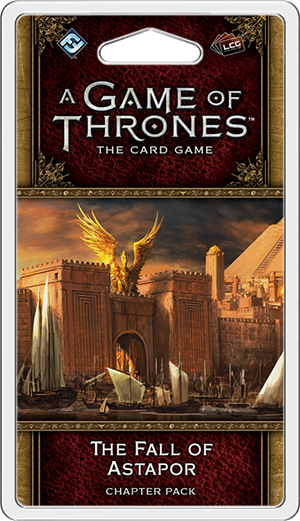Welcome to Card Game DB
Register now to gain access to all of our features. Once registered and logged in, you will be able to create topics, post replies to existing threads, give reputation to your fellow members, get your own private messenger, post status updates, manage your profile and so much more. If you already have an account, login here - otherwise create an account for free today!
Register now to gain access to all of our features. Once registered and logged in, you will be able to create topics, post replies to existing threads, give reputation to your fellow members, get your own private messenger, post status updates, manage your profile and so much more. If you already have an account, login here - otherwise create an account for free today!
FAQ for The Fall of Astapor
May 31 2017 12:00 AM |
mplain
in Game of Thrones
rules The North Remembers
The North Remembers- Since this card doesn't use the word "choose", you can play it even if one of the players has nothing to sacrifice (unlike Even Handed Justice).
- The card's effect resolves as follows: in player order, each player chooses a card to be sacrificed. Then, all chosen cards are sacrificed simultaneously (see Priority of Simultaneous Resolution).
- If a player chooses to sacrifice a character that has Marriage Pact attached, the forced interrupt triggers after all choices are made but before the chosen cards are sacrificed. The Pact's controller may then choose to sacrifice the same character that he has already chosen to sacrifice for The North Remembers, and end up sacrificing only one card for both effects.
- Sacrificing is the effect of this card, so you cannot sacrifice Pleasure Barge.
* * * * *
Recruiter for the Watch
- Blanking the Recruiter's text box (via Milk of the Poppy or Nightmares) will not immediately revert control of affected character (lasting effect created by the ability exists independently of its source).
* * * * *
Underground Vault
- A plot's gold value incorporates its base gold value and all relevant gold modifiers (e.g. The Roseroad, The Stone Drum, Kings of Winter) (see RRG entry for Income).
* * * * *
Spears of the Merling King
- This is not a save effect. You can use this card to return a character to your hand even if it is killed by an effect that says "cannot be saved" (e.g. Wildfire Assault).
- The affected character is not returned to your hand immediately upon the resolution of this ability. Rather, it creates a replacement effect that modifies what happens when the character is killed. After all interrupts to characters leaving play have resolved, the character is killed and returns to your hand (instead of being placed in your dead pile). So if your opponent triggers Bastard Daughter or Ser Waymar Royce after you trigger Spears of the Merling King, the affected character cannot be discarded from your hand, because it is still in play.
* * * * *
Lay Siege
- You cannot choose a kneeling location with this card.
- A good time to discard White Tree is during the standing phase, after all cards stand but before you return unspent gold to the treasury.
* * * * *
Duel
- If there are not enough valid targets at the time the opponent is choosing characters, the effect fails to resolve.
- A character that can neither be knelt nor killed (e.g. already kneeling and protected by The Eyrie) cannot be chosen as one of the targets for this effect.
- After the two initial target characters are chosen, you must choose one that can be knelt. Whether the other can be killed or not is irrelevant.



 Sign In
Sign In Create Account
Create Account











7 Comments
Are you sure about Lay Siege not being able to resolve on kneeling location? Compare it to Castle Black, which, as we know it, can do such thing.
The magic word is "Then". Lay Siege has it, Castle Black doesn't.
In order for the post-Then part to resolve, the pre-Then part must successfully resolve in full, i.e. change the game state in accordance with the intent of the pre-Then part. Since you cannot kneel a kneeling location, the pre-Then part does not change the game state => does not successfully resolve in full => the post-Then part cannot attempt to resolve.
Ok...
Grat Job FFG. Another intiutive interpretation of "Choose and {...}". Like it was worth forbidding to get rid of kneeling Contestd location.
Just treat "Then" as "If you do" and it'll all make sense.
Yeah, I get it from the "Then" definition. It is just another needless complication. I hate telling my opponents that some card worded in 90% same as other works different (Waking the Dragon, castle Black). It usually ends in I do not believe it", "I gottach check it", "whatever, cheater".
This game is just impossible to play on decent level withouth constant interest in rullings and exceptions. I do not believe this is something Living Card Game should stand for.
What prevents you from choosing a knelt/protected character with Duel? As long as one of the characters can be knelt, the game state would be changing so I'm not following that one...
http://thronesdb.com...eference#Target